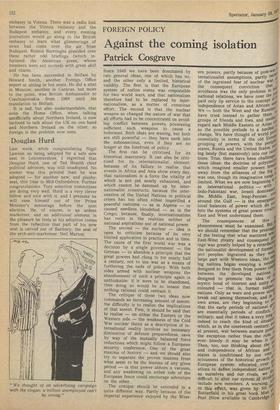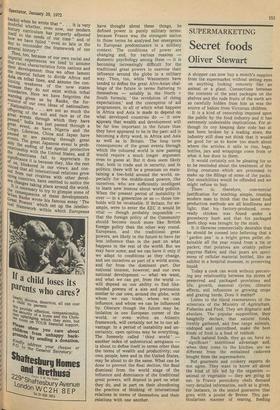FOREIGN POLICY
Against the coming isolation
Patrick Cosgrave
Since 1945 we have been dominated by two general ideas, one of which has no, and the other only a limited, historical validity. The first is that the European system of nation states was responsible for two world wars, and that nationalism therefore had to be replaced by internationalism, as a matter of conscious effort. The second is that the nuclear weapon so changed the nature of war that all efforts had to be concentrated on avoiding conflict between powers possessing sufficient such weapons to cause a holocaust. Both ideas are waning, but both are still powerful — they have sunk into the subconscious, even if they are no longer at the forefront of policy.
The first can be criticised for its historical inaccuracy. It can also be criti cised for its internationalist element: because of its failure to realise that events in Africa and Asia show every day, that nationalism is a force the vitality of which is not yet nearly exhausted, and which cannot be dammed up by inter nationalist constructs; because the inter vention of the United Nations in political crises has too often either imperilled a peaceful outcome — as in Algeria — or caused needless bloodshed — as in the Congo; because, finally, internationalism has roots in the realities neither of national aspirations nor of national power. The second — the nuclear — idea is open to criticism because of its very limited application in practice and in time.
The cause of the first world war was a decision by a single government — the German — to abandon a principle that the great powers had clung to for nearly half a century, not to use war as a means of furthering the ends of policy. With both sides armed with nuclear weapons the abandonment of such a principle again is unthinkable: if it were to be abandoned, then doing so would be so insane that nothing rational could restrain it.
The critique of these two ideas now commands an increasing amount of assent: the difficulty is to realise the implications of that assent. First, it should be said that to realise — on either the Eastern or the Western side — the weakness of the Cold War nuclear thesis as a description of in ternational reality involves no necessary diminution of defence preparedness, save by way of the mutually balanced force reductions which might follow a European security conference. One of the great maxims of history — and we should also try to separate the proven maxims from what seem to be the lessons of any given period — is that power abhors a vacuum, and any weakening on either side of the European fence could encourage adventure on the other.
The critique should be extended in a quite different way. Partly because of the imperial experience enjoyed by the West ern powers, partly because of posi.-ternationalist assumptions, partly ne'lip of the ingrained fear of nuclear war' it the consequent conviction that, re avoidance was the only problem in 11, national relations, we have over the paid only lip service to the concept cnte. independence of Asian and African s°, We — both the West and the Russiaaso have tried instead to gather then) groups of friends and foes, and tencle":45 regard each Middle Eastern or Asian as the possible prelude to a nuclear,itic change. We have thought of world Pe:,0 essentially in terms of the old Etneo grouping of powers, with the penPo states, Russia and the United States, e ing lately (but massively) into our cat! tions. True, there have been challengf:4 these ideas: the doctrine of polycennco which imagined smaller powers breati, away from the alliances of the big was one, though its imaginative range si limited. What we are now beginning t°6 in international politics — Withet Indo-Pakistani war, Israeli dominan4 the Middle East, Iraqi-Persian around the Gulf — is the emergen't,, I local' balances of power which do into the systems of great power rival'I East and West understand them.
The consequences of this phenomenon must be examined. But,,ti we should remember that the prolonn of the feeling that what mattered 0_54 East-West rivalry and consequent ings was greatly helped by a retardatl the nationalist development of for'L ject peoples. Ingrained as they large part with Western ideas, the !,40 ing nations began essaying a nell';# designed to free them from power CO-i between the developed nations, designed to promote the idea of,to mystic bond of interest and unitY coloured — that is, former subje,cd nations. Only as wars and power str"'ip break out among themselves, and in,it own areas, are they beginning to that the early periods of national are essentially periods of confl1nt,0 military, and that it takes a very 1°1fn1,Pos indeed to reach the kind of situ,i1 which, as in the nineteenth centurY,:ei at present, war between mature P0''' the exception rather than the rulev ever bloody it may be when it esti Then, too, our thinking about the 1;5 and independence of African and r states is conditioned by our owP„f' sciousness of the historical growth vel European system: educated over gsfi ations to define independent nation as ourselves and our rivals, We kfijoi difficult to alter our system of thin7r0 include new members. A warning, :,e? to this effect, was given by Sir P0 Butterfield in his great book Man Past (Now available in Cambridge backs) when he wrote that " . . . it is very doubtful whether, even now, our modern history curriculum has properly adjusted itself to the needs of our time" and of how we have failed "even so late in the day to reconsider the framework of our general history." . Then, too, because of our own racial and imperial experiences we tend to assume that racial characteristics form nations and their development: thus we often lament the imperial failure to divide Africa and Asia on tribal lines, and assume the conUnoing weakness of the new states because they do not exist within tribal boundaries. Here we have forgotten the Twarning given us by Ranke, the .forulator of our own ideas of nationalism: Nationalities . . . are not so much the at offspring of the soil and race as of the gre events through which they have Passed. " India has just passed through a great event, as have Nigeria and the Congo. Likewise, China and Japan have Passed or are passing through great events. The great Japanese event is probably the ending of her special protective threlationship with the United States, and if e . Americans fail to appreciate its ofsignificance it is because they, like the rest us, blinkered in our views, and convinced that all international relations grow out. from our rivalries with other devel°Plog countries, have omitted to notice the sea changes taking place around the world. th It is necessary to try to glimpse some of v i el , c°osequences of these developments. , he Ranke wrote his famous essay 'The Great Powers ' which set up the intellecual framework within which Europeans have thought about these things, he defined power in purely military terms: because France was the strongest nation in those terms he analysed her emergence to European predominance in a military context. The conditions of power are changing and, for various reasons — domestic psychology among them — it is becoming increasingly difficult for the traditional great powers to exercise their influence around the globe in a military way. Then, too, while Westerners have tended to define the great Afro-Asian challenge of the future in terms flattering to themselves — notably in the North v South formula, the revolution of rising expectations,' and the conception of aid programmes, in all of which what happens in Africa and Asia is made to depend on what developed countries do — it now appears that wealth and development will be far less important in the future than they have appeared to be in the past: aid is becoming a dirty word, in Africa and Asia as well as in Britain. The long term consequences of the great events through which the coloured world is now passing would require a much longer argument even to guess at. But it does seem likely that, both in trade and in security, and in politics, there will be a premium on maintaining a toe-hold around the world, especially for the middle-sized powers, like ourselves, who are sufficiently intelligent to learn new lessons about world politics. When the present period of instability is over — in a generation or so — those toeholds will be invaluable. If Britain, for example, were to enter the EEC it would be vital — though probably impossible — that the foreign policy of the Community should become much more like British foreign policy than the other way round. Europeans, and the traditional great powers, are likely in the future to have far less influence than in the past on what happens in the rest of the world. But we may have some, and we can have it only if we adapt to conditions as they change, and see ourselves as part of a world scene, and far from the dominant part. Our national interest, however, and our own national development — what we want, and what we can get, from the world — will depend on our ability to faid likeminded powers of a size and pretension similar to our own, around the globe, with whom we can trade, whom we can influence, and whom we can be influenced by. Obscure though the future may be, isolation in one European corner of the world, or even within an Atlantic framework, will certainly not be to our advantage. In a period of instability and uncertainty, open options may be everything. The formerly called third world' — another index of unhistorical arrogance — is about to define itself in terms other than the terms of wealth and productivity; our own people, here and in the United States, may be about to do the same. What can be done to prevent the final decline, the final dismissal from the world stage of the influence and dominance of the traditional great powers, will depend in part on what they do, and in part on their abandoning the practice of thinking of international relations in terms of themselves and their relations with one another.











































 Previous page
Previous page